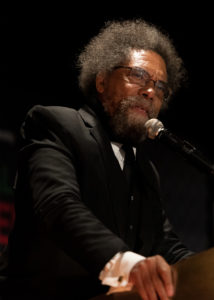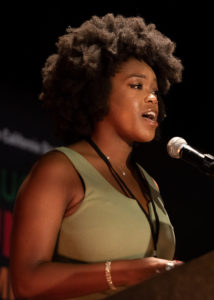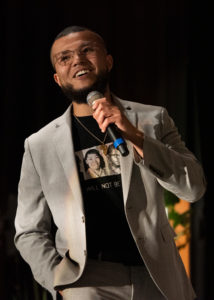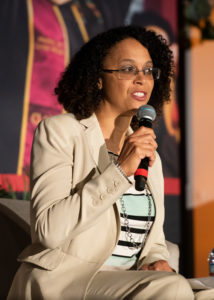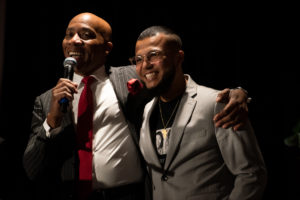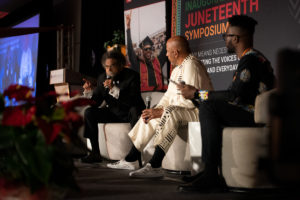CSUDH Hosts Inaugural Juneteenth Symposium
California State University (CSU) held its first Juneteenth Symposium in June 2022, celebrating Black history and achievement while demanding justice and equity within higher education and beyond. The CSUDH hosted the event, titled “By Any Means Necessary: Synthesizing the Voices of Our Ancestors and Everyday People.”
CSU Board of Trustees Emerita Maryana Khames led the push to create the symposium after listening to students demand action in the wake of George Floyd’s murder. Students called on the CSU to take the lead in combating anti-Black racism and championing diversity, equity, and inclusion across the CSU’s 23 campuses and throughout higher education.
In acknowledging Khames, former Board of Trustees Chair Lillian Kimbell committed the CSU system to that purpose. “This year’s symposium is indeed a trailhead, one that will guide us toward tangible and lasting change,” she said. “It’s essential that beyond the two-day celebration, we commit to finding short-term and long-term solutions.”
As the host university, CSUDH was active in the symposium planning and had key roles throughout. Vice President of Student Affairs William Franklin served as the event co-chair and master of ceremonies. He noted that CSUDH was uniquely poised to nurture constructive and critical discourse.
“The campus was birthed out of the Watts Rebellion,” Franklin said. “We wanted to use this event to hold ourselves and the CSU accountable to shift the paradigm and move to act.”
Throughout the symposium, CSUDH students and alumni took to the stage to deliver remarks. They were joined by CSU presidents and officials, higher education experts, and prominent Black leaders and scholars. CSUDH President Thomas A. Parham said he wanted people to not only be inspired, informed, and empowered by speakers, but to create “a catalyst for real and substantive change in the CSU system,” and to “chronicle the issues for the entire nation to listen and bear witness to.”
Several themes recurred throughout the symposium, including the celebration of Black excellence and the personal courage required to break through institutional barriers and pursue higher education. Speakers emphasized the necessity of having Black people represented at every level of education, industry, and government, and the importance of Black youth being able to see themselves reflected in role models around them—particularly in educational settings.
Many also expressed profound gratitude for previous generations of Black freedom fighters, artists, and thought leaders who paved the way for people of today, as well as the necessity for the work to continue. “We have to understand that this is a generational struggle,” said CSUDH student Makonnen Tendaji. “We don’t organize and become educated so that we benefit ourselves. We build our schools and teach our children so that they can benefit from that knowledge.”

